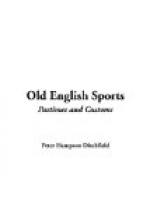In the volume, recently published, which treated of the story and the antiquities of “Our English Villages,” I pointed out that the Church was the centre of the life of the old village—not only of its religious life, but also of its secular every-day life. This is true also with regard to the amusements of the people. The festival of the saint, to whom the parish church was dedicated, was celebrated with much rejoicing. The annual fair was held on that day, when, after their business was ended, friends and neighbours met together and took part in some of the sports and pastimes which I shall try to describe. The other holidays of the year were generally regulated by the Church’s calendar, the great festivals—Christmas, Easter, Ascension Day, Whit Sunday—–being all duly observed. I propose to record in these pages the principal sports, pastimes, and customs which our forefathers delighted in during each month of the year, the accounts of which are not only amusing, but add to our historical knowledge, and help us to realize something of the old village life of rural England.
We will begin with New Year’s Day[1]. It was an ancient Saxon custom to begin the year by sending presents to each other. On New Year’s Eve the wassail bowl of spiced ale was carried round from house to house by the village maidens, who sang songs and wished every one “A Happy New Year.” “Wassail” is an old Saxon word, meaning “Be in health.” Rowena, the daughter of the Saxon king Hengist, offered a flowing bowl to the British king Vortigern, welcoming him with the words, “Lloured King Wassheil.” In Devonshire and Sussex it was the custom to wassail the orchards; a troop of boys visited the orchards, and, encircling the apple-trees, they sang the words—
“Stand fast, bear
well top,
Pray God send
us a howling crop;
Every twig, apples
big;
Every bough, apples
enow;
Hats full, caps
full,
Full quarter-sacks
full.”
Then the boys shouted in chorus, and rapped the trees with their sticks.
The custom of giving presents on New Year’s Day is as old as the time of the Romans, who attached superstitious importance to it, and thought the gifts brought them a lucky year. Our Christian forefathers retained the pleasant custom when its superstitious origin was long forgotten. Fathers and mothers used to delight each other and their little ones by their mutual gifts; the masters gave presents to their servants, and with “march-paynes, tarts, and custards great,” they celebrated the advent of the new year. Oranges stuck with cloves, or a fat capon, were some of the usual forms of New Year’s gifts.
The “bringing-in” of the new year is a time-honoured custom; which duty is performed by the first person who enters the house after the old year has expired. In the North of England this important person must be a dark man, otherwise superstitious folk believe that ill-luck would befall the household. In other parts of England a light-complexioned man is considered a more favourable harbinger of good fortune.




